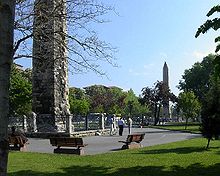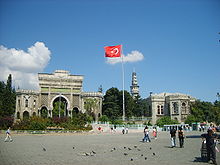
Turkey is the 17th most densely populated country (73 million) in the World. The majority of the population consists of young people, about 40% of whom are under the age of fifteen. 72% are below the age of 35. To educate its young population, Turkey's Ministry of National Education (MoNE) has implemented an architecture which supports information communication technologies (ICTs). The vision of ICTs in Turkey includes the following: 1 Integration of the education system with high technologies, 2 Supporting the education system with innovations, 3 Continuous promotion via measure and assessment, 4 Providing student centered and project based education by using information technologies. 1 The vision of the educational system in Turkey is geared towards providing Networked learning to its population. A few lifelong learning initiatives in Turkey are stretching beyond traditional educational institutions, leading to informal and non-formal learning opportunities. These processes which have been implemented put Turkey at a mature stage with regards to both Network Learning and Network Readiness. To asses Network Learning and if the educational system integrates ICTs this paper will briefly discuss 1) The educational systems access to ICTs, 2) Using ICTs to enhance education and 3) Providing ICT related education to develop the workforce
School's Access to ICTs (Stage 3/Stage 4)
There are approximately 14,000,000 students, 575,000 teachers in 42,000 primary and secondary education schools in Turkey. 15,000 computer labs are established in these schools 1 More than one third of the existing 5,851 schools have at least one computer lab.

Apart from the hardware which most schools have deployed in their computer labs, the MNE has also implemented an educational web portal which provides funding to schools so they can benefit from ICTs. The portal provides: 1.ICT equipment to approximately 3,000 more elementary education schools 2.Provide educational materials to 4000 additional elementary schools 3.Train more teachers, principals and supervisors 4.Continued program implementation support 5.Continued program progress and evaluation activities.1
In 1998, the MoNE received a loan, equivalent to 600 million US dollars from the World Bank to invest in a two-phase National Basic Education Program (BEP), which is still being implemented. In order to improve the quality of Turkey's education, one of the objectives of this development program is to ensure each student and teacher becomes at least literate in Information and Communication Technology (ICT).1
The Directorate of Educational Technologies in Turkey states three main aims in terms of e-learning (1) developing ICT infrastructure and integrating it into education (2) creating electronic content and producing educational material (3) open university organization and examination services. According to a report from Brown University, Turkey has made significant progress in the provision of Internet services by public institutions, and was ranked 8th in the world (2007). With specific regards to ICT infrastructure, Turkey has recently completed the implementation and planning of ICT classes in all schools. There is one computer, one projector, one printer and one scanner available for every 15 students. The country is aiming to finish its ICT equipment project by the end of 2009. Currently 94% of primary education students and 100% of secondary education students have Internet access.
Enhancing Education with ICTs (Stage3/Stage 4)
MoNE's main ICT enabler is the Education Portal. (www.egitim.gov.tr). The education portal provides content which has become easily reachable for the teachers and students by opening. The portal provides rich content and activities which is especially necessary in primary education programs.
The portal provides further ability to fully integrate ICTs into the curricula, and is used in the classroom as an essential tool to facilitate the learning process. The ability to reach multiple gateways, digital archives, online course notes,Online course programs on TV and radio to enrich the learning process for students is provided. To facilitate the learning process by enabling teachers to implement ICTs also places Turkey in a mature stage. The portal provides teachers with: online testing and results to stream line educational processes and further make ICT practices more concrete and valuable
Developing the ICT Workforce (Stage 4)
Turkey is encouraging teachers and students to join a number of e-learning related programs provided by companies like CISCO, Intel, Linux and Microsoft. Tendering processes for establishing more centers for public access, vocational training centers, and public libraries were to be accomplished before December 2007. Also the educational portal provides with further training to teachers and vocational students as well. The MoNE portal provides teachers who are also an important resource for the enabling of ICTs with training programs so they can interact with the portal and proficiently perform on their job. Some training to enable teachers includes:
Authoring Software Training
Distant Teacher Education (Microsoft) (Number of educated Teachers : 575,952) (Number of Active user : 161,375)
Intel Teacher Program ( Number of educated Teachers: 95,914)
Innovative Teachers Program

